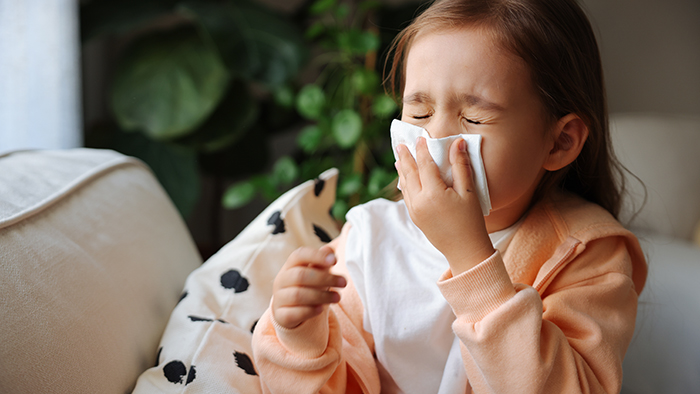Is that cough and runny nose RSV?
December 19, 2023
RSV, which stands for respiratory syncytial virus, is a very well-studied virus that can cause common cold-like symptoms in older children and adults and severe, debilitating airway inflammation in younger infants.
RSV infects the lungs and breathing passages and can be spread through droplets when a child coughs or sneezes. It can also live on countertops, doorknobs, hands and clothing. Although most RSV infections appear as colds, some can be severe enough to require hospitalization. Most children are infected with RSV at least once by age four.
RSV is very common, but it can be more severe for children with certain health conditions. As we approach the time of year when RSV cases reach their peak, it is important for families to follow some general prevention measures.
RSV spreads through direct contact with the virus. Avoid close contact with others who may be infected. Wash your hands often with soap and water, avoid touching your face, and use a disinfectant to clean frequently touched surfaces such as phones, doorknobs and counters.
In toddlers and school-age children, symptoms of RSV typically begin four to six days after being infected and most often include a profuse, clear runny nose along with cough, fever and decreased appetite. Young infants with RSV can similarly have a runny nose, cough, fever and decreased appetite, but they may also have fussiness and decreased activity.
RSV in all children generally progresses gradually, but young infants are at the highest risk for symptoms such as a more severe cough, an increased breathing rate and low oxygen levels. Young infants with RSV more often develop ear infections and pneumonia and require hospitalization or ICU admission. Medical providers are on high alert during RSV season, especially with young infants, to observe the sometimes-subtle signs at the beginning of RSV illness to best care for these patients.
If your child does have RSV, here are some steps to follow:
RSV infects the lungs and breathing passages and can be spread through droplets when a child coughs or sneezes. It can also live on countertops, doorknobs, hands and clothing. Although most RSV infections appear as colds, some can be severe enough to require hospitalization. Most children are infected with RSV at least once by age four.
RSV is very common, but it can be more severe for children with certain health conditions. As we approach the time of year when RSV cases reach their peak, it is important for families to follow some general prevention measures.
RSV spreads through direct contact with the virus. Avoid close contact with others who may be infected. Wash your hands often with soap and water, avoid touching your face, and use a disinfectant to clean frequently touched surfaces such as phones, doorknobs and counters.
In toddlers and school-age children, symptoms of RSV typically begin four to six days after being infected and most often include a profuse, clear runny nose along with cough, fever and decreased appetite. Young infants with RSV can similarly have a runny nose, cough, fever and decreased appetite, but they may also have fussiness and decreased activity.
RSV in all children generally progresses gradually, but young infants are at the highest risk for symptoms such as a more severe cough, an increased breathing rate and low oxygen levels. Young infants with RSV more often develop ear infections and pneumonia and require hospitalization or ICU admission. Medical providers are on high alert during RSV season, especially with young infants, to observe the sometimes-subtle signs at the beginning of RSV illness to best care for these patients.
If your child does have RSV, here are some steps to follow:
- Closely monitor infants and younger children, especially those born prematurely or with chronic lung or heart disease.
- Make sure your child washes his or her hands, especially after touching infected surfaces or having contact with someone with cold symptoms.
- At home, make your child with an RSV infection as comfortable as possible. Allow time for recovery and provide plenty of fluids to prevent dehydration.
- Call your child’s pediatrician if your child experiences a high fever, thick nasal discharge, a worsening cough, or trouble breathing.
- If your child is experiencing trouble breathing, loss of consciousness, signs of severe dehydration, or fever of 100.6 or higher for infants younger than eight weeks, seek emergency care.
